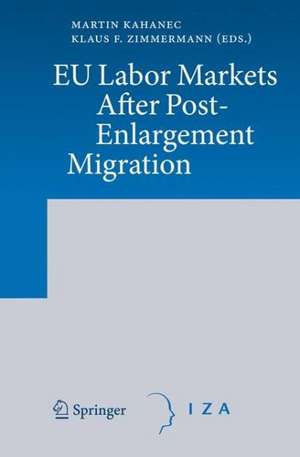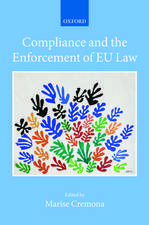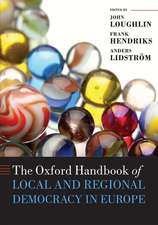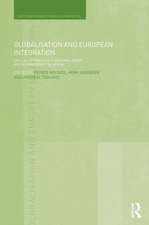EU Labor Markets After Post-Enlargement Migration
Editat de Martin Kahanec, Klaus F. Zimmermannen Limba Engleză Paperback – 12 oct 2014
Are immigrants from the new EU member states a threat to the Western welfare state? Do they take jobs away from the natives? And will the source countries suffer from severe brain drain or demographic instability? In a timely and unprecedented contribution, this book integrates what is known about post-enlargement migration and its effects on EU labor markets. Based on rigorous analysis and hard data, it makes a convincing case that there is no evidence that the post-enlargement labor migrants would on aggregate displace native workers or lower their wages, or that they would be more dependent on welfare. While brain drain may be a concern in the source countries, the anticipated brain circulation between EU member states may in fact help to solve their demographic and economic problems, and improve the allocative efficiency in the EU. The lesson is clear: free migration is a solution rather than a foe for labor market woes and cash-strapped social security systems in the EU.
| Toate formatele și edițiile | Preț | Express |
|---|---|---|
| Paperback (1) | 643.16 lei 6-8 săpt. | |
| Springer Berlin, Heidelberg – 12 oct 2014 | 643.16 lei 6-8 săpt. | |
| Hardback (1) | 647.40 lei 6-8 săpt. | |
| Springer Berlin, Heidelberg – 4 noi 2009 | 647.40 lei 6-8 săpt. |
Preț: 643.16 lei
Preț vechi: 756.65 lei
-15% Nou
Puncte Express: 965
Preț estimativ în valută:
123.07€ • 128.84$ • 101.83£
123.07€ • 128.84$ • 101.83£
Carte tipărită la comandă
Livrare economică 05-19 aprilie
Preluare comenzi: 021 569.72.76
Specificații
ISBN-13: 9783642424519
ISBN-10: 3642424511
Pagini: 352
Ilustrații: VIII, 344 p.
Dimensiuni: 155 x 235 x 18 mm
Greutate: 0.49 kg
Ediția:2010
Editura: Springer Berlin, Heidelberg
Colecția Springer
Locul publicării:Berlin, Heidelberg, Germany
ISBN-10: 3642424511
Pagini: 352
Ilustrații: VIII, 344 p.
Dimensiuni: 155 x 235 x 18 mm
Greutate: 0.49 kg
Ediția:2010
Editura: Springer Berlin, Heidelberg
Colecția Springer
Locul publicării:Berlin, Heidelberg, Germany
Public țintă
ResearchCuprins
EU Enlargement and the Labor Markets: What Do We Know?.- Lessons from Migration after EU Enlargement.- Labor Mobility in the Enlarged EU: Who Wins, Who Loses?.- Post-Enlargement Migration and Public Perception in the European Union.- The Impact of Migration on Destination Labor Markets.- EU Enlargement under Continued Mobility Restrictions: Consequences for the German Labor Market.- The Experience of Spain with the Inflows of New Labor Migrants.- EU Enlargement and Ireland#x2019;s Labor Market.- Post-Enlargement Migration and Labor Market Impact in Sweden.- The Impact of the Recent Expansion of the EU on the UK Labor Market.- The Impact of Migration on Source Labor Markets.- Impact of the Post-Accession Migration on the Polish Labor Market.- The Post-Enlargement Migration Experience in the Baltic Labor Markets.- The Case of Albania.
Textul de pe ultima copertă
Are immigrants from the new EU member states a threat to the Western welfare state? Do they take jobs away from the natives? And will the source countries suffer from severe brain drain or demographic instability? In a timely and unprecedented contribution, this book integrates what is known about post-enlargement migration and its effects on EU labor markets. Based on rigorous analysis and hard data, it makes a convincing case that there is no evidence that the post-enlargement labor migrants would on aggregate displace native workers or lower their wages, or that they would be more dependent on welfare. While brain drain may be a concern in the source countries, the anticipated brain circulation between EU member states may in fact help to solve their demographic and economic problems, and improve the allocative efficiency in the EU. The lesson is clear: free migration is a solution rather than a foe for labor market woes and cash-strapped social security systems in the EU.
Caracteristici
Includes supplementary material: sn.pub/extras














